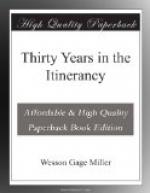The two types of society, thus placed side by side, were now given an open field, in which the contest for supremacy could not long be delayed. In geographical position, it would seem that the advantage was decidedly with the South. And the same may be said of the patronage bestowed by the home governments. But notwithstanding the high mountain ranges, the deep forests, and the sterile coasts of New England, her people cut their way through every obstacle, and soon stood face to face with their aristocratic neighbors. A collision of ideas was now inevitable. The South, quick to discover the unheralded force of Yankee character, took the alarm and declared that “Mason and Dixon’s line” should divide between her and her neighbor. Here was deposited the first egg in the nest, from which has been hatched the terrible brood of vipers which, under the name of “State Rights,” has involved the country in a most desolating war. It was on this line that Calhoun planted his standard when he sought to inflame the South against the North. And it was on this fatal line that his followers, thirty years after, sought to overturn the decisions of the ballot-box, and establish a Southern Confederacy. With what result, the record of the conflict affords an answer.
On the 13th of April, 1861, the rebels opened fire on Fort Sumter, and on the 14th Major Anderson and his brave men were compelled to surrender their stronghold. As the news of this attack and surrender swept along the telegraphic wires throughout the North, a most intense patriotism awoke in the heart of every loyal citizen. The people assembled on the corners of the streets, in halls, in places of business, and in short, at every convenient place of resort, to discuss the situation, and feed the flames of patriotism. Everywhere men and money were offered to support the government, without stint. The press teemed with burning words, and the pulpit was outspoken in characterizing the rebellion and vindicating the government.
The writer was in Milwaukee when the news of the surrender of Fort Sumter reached the city. On Sabbath, April 21st, I preached a sermon, from which the following extract is taken. I quote from Rev. Mr. Love’s “History of Wisconsin in the War.”
“But, Ladies and Gentlemen, the war is inevitable. Its coming may be hastened or retarded by the shaping of events during the next thirty days, but that war is upon us, and a civil war, of a most frightful character and most alarming proportions, is to my mind no longer a question. You can no more prevent it than you can stay the leaping floods of Niagara, or ¸quench the king of day in the palm of your hand. It is the legitimate offspring of an ‘irrepressible conflict’ of ideas as antagonistic as light and darkness, as diametrically opposed to each other as right and wrong, truth and error. The Bible declaration, that God hath made of one blood all the nations of men to dwell on all the face of




